The Imitation Game Blu-ray Movie
HomeThe Imitation Game Blu-ray Movie 
Blu-ray + UV Digital CopyStarz / Anchor Bay | 2014 | 114 min | Rated PG-13 | Mar 31, 2015
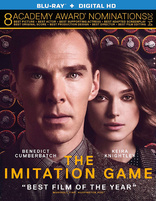
Movie rating
7.7 | / 10 |
Blu-ray rating
| Users | 4.2 | |
| Reviewer | 4.0 | |
| Overall | 4.0 |
Overview
The Imitation Game (2014)
English mathematician and logician, Alan Turing, helps crack the Enigma code during World War II.
Starring: Benedict Cumberbatch, Keira Knightley, Matthew Goode, Rory Kinnear, Allen LeechDirector: Morten Tyldum
| Biography | 100% |
| History | 76% |
| Drama | 49% |
| War | 38% |
| Thriller | Insignificant |
Specifications
Video
Video codec: MPEG-4 AVC
Video resolution: 1080p
Aspect ratio: 2.39:1
Original aspect ratio: 2.39:1
Audio
English: DTS-HD Master Audio 5.1 (48kHz, 24-bit)
Spanish: Dolby Digital 5.1 (448 kbps)
BDInfo verified.
Subtitles
English SDH, Spanish
Discs
50GB Blu-ray Disc
Single disc (1 BD)
UV digital copy
Packaging
Slipcover in original pressing
Playback
Region A (locked)
Review
Rating summary
| Movie | 4.5 | |
| Video | 5.0 | |
| Audio | 4.5 | |
| Extras | 2.5 | |
| Overall | 4.0 |
The Imitation Game Blu-ray Movie Review
Rise of the machines, fall of a man.
Reviewed by Martin Liebman March 20, 2015One's mental image of the act of waging war certainly brings to mind depictions of bombs, bullets, and bloodied soldiers. It also conjures up images of commanding officers dutifully drawing up plans for battle and rallying men to the cause. It perhaps even recalls depictions of men and women waging the war of information and ideas, the behind-the-scenes propaganda machine meant to both rally support at home and instill fear and doubt abroad. But the last one -- the battle of ideas -- sometimes extends well beyond posters and radio messages and drives straight to the heart of the war, where a battle may not be won or lost or a life saved or destroyed but where, behind closed doors and far away from the front, the tide slowly turns with the churning of minds and the development and deployment of ideas, ideas that can have as large an impact as any bomb or bullet-pointed presentation that's spells out a way to win the war. The Imitation Game tells the remarkable true story of one man's devotion to the cause of breaking enemy codes and, while not engaging directly in battle, seeing his handiwork at home serve as a key turning point in the war. But the film also depicts that same man's struggles not with who he is but how he is perceived and the war waged against him both overtly and covertly in response to not just his socially wayward ways but also the social stigma of his homosexuality.
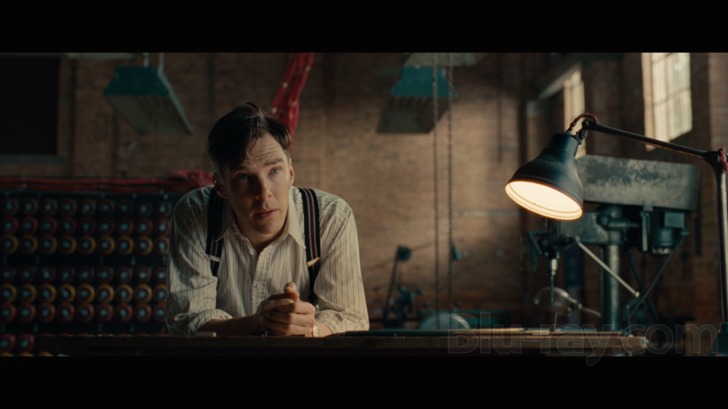
The smartest man in the room.
Alan Turing (Benedict Cumberbatch), a 27-year-old prodigy who is also a homosexual, is recruited to work at Bletchley Radio Manufacturing where he's to covertly crack the secret of the German Enigma coding machine that sends indecipherable signals in the open. Even as the allies have secured one of the devices, it's proving impossible to work, requiring as many as 159 million-million-million permutations to break a code that's changed on a daily basis. Alan believes he's up to the challenge, but at the same time he expresses his displeasure with his colleagues, refusing to cooperate and working in solitude -- as much solitude as he can find, anyway -- on a machine that stands a better chance of deciphering the code than the human mind, at least in the time available. After penning a letter to Winston Churchill himself, Alan secures the finds necessary to construct his machine. He's also placed in charge of the group and promptly fires two of his team which only further distances himself from the remaining men. He seeks to refill the ranks through a sly newspaper recruiting effort that lands him Joan Clarke (Keira Knightley), a woman who is, like Alan, highly intelligent and driven but pushed away, not because of social waywardness or sexuality but rather her gender. As they work to break the code, Alan is forced to interact with others and face a number of additional challenges, related to war and to himself, along the way to allied victory in Europe.
The Imitation Game does a fine job at spelling out the basics -- why breaking the code is important, how it can and will be achieved, the technical trials, failures, and successes of the operation -- but the film is much larger than a simple dramatization of how a collected group of individuals traveled from point A, working with supposedly indecipherable codes, to point B, breaking the codes and dealing with the consequences not of putting the information to use but rather how to strike that perfect balance between all but openly acknowledging their success and thereby destroying the effort or surreptitiously deploying the intelligence to gain the upper hand. Through these scenes, to which the film does dedicate the bulk of its screen time, it finds a dazzlingly consistent pace and sense of immersion into the code breaking world. But it's beyond all of that where the film truly shines, finds its purpose, and explores an even more interesting angle.
More so than a portrait of behind-the-scenes warfare, The Imitation Game paints a portrait of a man, one of the most complex characters ever depicted on the screen. Alan Turing is an eccentric man, obsessive compulsive in his daily routine, and a social pariah. But he's quick-witted, capable of playing the back-and-forth game and exposing weakness and unbalance even in casual conversation, speaking directly without much of a filter. That plays an interesting contrast against, but also sets a foundation for, his love for puzzles and ability to understand them, decipher them, and ultimately build a machine to do the job of breaking them with a speed and efficiency many degrees of magnitude more quickly than even the sharpest human mind. Yet he can barely carry on a mundane conversation about what he wants for lunch and whether he'd like to join his co-workers for a bite to eat. He refuses to place himself on a pedestal -- he's "barely making par" next to great minds like Newton and Einstein -- and he seems to enjoy both playing down to his audience and build up beyond their level. He slowly grows more accustomed to working with others, but doing so forces him to face a number of realities about who he is, what he does, what he is capable of doing, and how he has done it. By the end, it all seems to come back to his sexuality.
The Imitation Game doesn't allow the issue of Turing's homosexuality to devour the film, but it does define much of it, particularly late in the film once it largely takes center stage. He's far more progressive than many in his circle -- a circle he'd admittedly rather see closed, or eliminated altogether, rather than expanded -- which allows him to look past Joan's gender when she proves herself more capable than anyone else in the room. The film is often more overt with her character as it depicts, first, a reluctance (not on Alan's part) to even admit that she could be a candidate for the program based solely on her gender and, later, when her parents disapprove of the idea of her working with men when she's unmarried and, presumably, a better fit for a lesser job, one that fits the mold of a traditional female role. The movie does, then, play with some ideas on acceptance and looking beyond the surface, and even as these are critical parts of defining the greater story, they're mildly underplayed in a way that allows them to gently support the greater arcs, not define them, even as they become key parts in the larger whole.
What truly sells the movie, however, is Benedict Cumberbatch in what is a deservedly Oscar nominated performance of one of the most interestingly complex characters ever to appear on screen. Cumberbatch's Turing is a unique individual, certainly not a Raymond and not even quite so socially handicapped as Adrian Monk. No, Cumberbatch is challenged with building a much more inwardly complex individual whose exterior is certainly defined by who he is on the inside -- which the film smartly comes to fully define in a number of carefully inserted, short, but crucial flashbacks to his youth -- but who must still operate on some level of confidence in the social arena, an arena into which he enters more for the challenge of the code rather than as a challenge to his reclusive personality, which he holds close and in high regard. He slowly seems to exit his shell as he realizes he both needs others at his side and seems to even come to appreciate their company and contributions, yet in a critical scene late in the film, all of his growth comes crashing down around him when he admits to manipulating a situation for the betterment of his project rather than as a true opening of his heart or as a compassionate response to another's feelings. It's the best, and most heartbreaking, moment in the movie that fully defines the Turing character better than all of the wonderful bits of Cumberbatch's performance that both come before and come after.
The Imitation Game Blu-ray Movie, Video Quality 

The Imitation Game's 1080p Blu-ray transfer is flawless. Anchor Bay's 2.39:1-framed image reaches the zenith of clarity, detailing, and color reproduction. It's naturally sharp and stable across the entire frame. Details are exacting, whether basic skin and heavy clothing lines or more subtle wooden patterns in various offices, terrain, machinery, scuffed trunks and train bodies in an early station shot, and even chalkboard surfaces. All dazzle considering both basic textures and intricate surface nuance alike. Colors are pleasing and consistent with a natural flavor evident in both the brightest and lowest-light scenes alike. There's a definite chill to the palette, a light push to the production design that favors a somewhat gray, mildly dreary appearance, but every hue inside -- whether bright reds and greens or more subtle earthy tones -- is dazzling in terms of consistency and accuracy. Flesh tones are mildly pale while black levels are deep and precise. The image suffers from no discernible banding, blockiness, or other intrusive eyesores. Very light grain remains over a picture-perfect, film-quality presentation.
The Imitation Game Blu-ray Movie, Audio Quality 
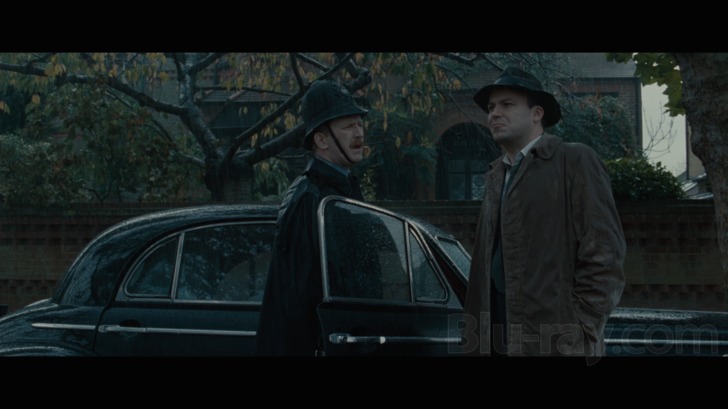
The Imitation Game's DTS-HD Master Audio 5.1 lossless soundtrack is rich and pleasing throughout. Musical delivery is frequently airy, featuring a wide yet balanced front end element and a naturally immersive surround support. Minor low end support gives it a little necessary weight. Music mildly drowns out some old radio broadcast clips early in the film. There's not much in the way of hugely aggressive sound effects. A handful of recreated battle scenes featuring rattly bombers and rumbly tanks offer a good baseline aggression. Less aggressive sound effects are nicely defined but often fail to stretch too far into the back; pouring rain in one early scene largely lingers up front, but churning machine gears, a loud ringing bell, and other, meatier sound effects are delivered with pinpoint clarity and punch. Dialogue is healthy and firmly center-focused with a few short bursts of light reverberation when the shot demands it.
The Imitation Game Blu-ray Movie, Special Features and Extras 
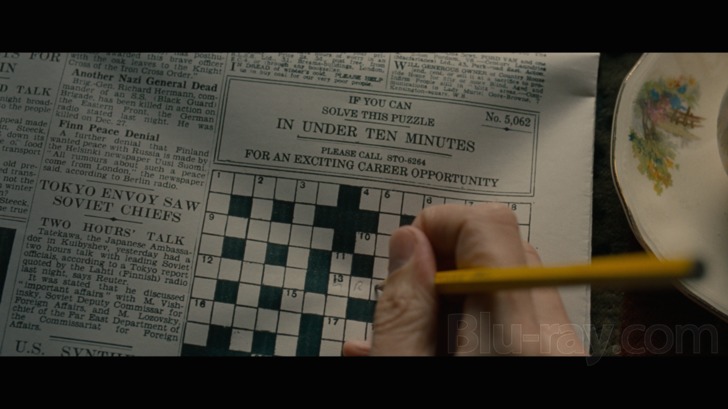
The Imitation Game contains a commentary, deleted scenes, a featurette, and highlights from three different Q&A sessions. Inside the
Blu-ray case, buyers
will find a voucher for a UV digital copy of the film.
- Audio Commentary: Director Morten Tyldum and Screenwriter Graham Moore discuss the film's three-period structure, the real history behind the story, visual effects and crafting the brief war sequences, casting and performances, production design, the picture's perspective, the film's deeper themes, and more. This is a good, well-spoken track that supports the movie well.
- The Making of The Imitation Game (1080p, 22:44): A look at characters and plot specifics with a tighter focus on the life and work of the real Alan Turing, World War II and the people assembled to break the Enigma machine, the process of breaking the code, the repercussions of breaking the code, the consequences of Turing's homosexuality, Benedict Cumberbatch's performance, Keira Knightley's work, the supporting cast, and the picture's score.
- Deleted Scenes (1080p): Nock Is Being Followed (2:17) and Nock Discovers Alan (1:33).
- Q&A Highlights (1080p, 29:11): Bits of three different Q&A sessions. First, Screenwriter Graham Moore, Producer Teddy Schwarzman, and Director Morten Tyldum discuss the film from the Telluride Film Festival, August 29, 2014, hosted by Deadline's Pete Hammond. The piece shifts to The Hollywood Reporter's Scott Feinberg hosting Director Morten Tyldum and Actors Benedict Cumberbatch and Keira Knightley at the Screen Actors Guild, November 8, 2014. Next, Moderator David Friendly hosts Producers Ido Ostrowsky, Nora Grossman, and Teddy Schwarzman; Production Designer Maria Djurkovic; Costume Designer Sammy Sheldon Differ; and Music Supervisor Lindsay Fellows.
The Imitation Game Blu-ray Movie, Overall Score and Recommendation 
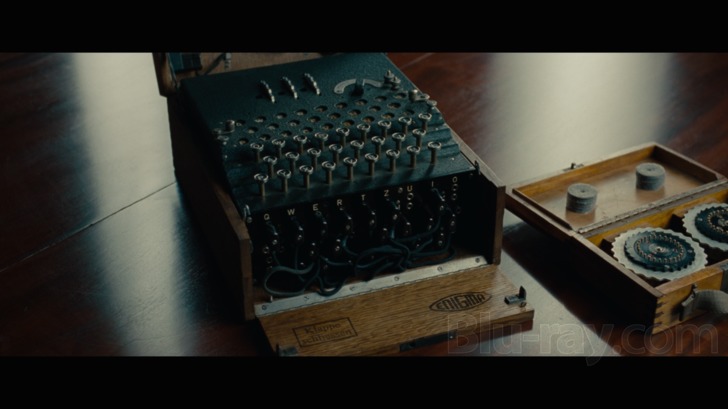
The Imitation Game deals with a complex problem and, at the same time, deals with complex people. This is a brilliant film on a number of levels, including its base story of World War II code breakers but much more satisfying the life and journey of one of the most complicated figures ever to be depicted on the screen. Benedict Cumberbatch's performance is extraordinarily deep, nailing the superficialities but building the character from the inside out. He's certainly aided by a tight, detailed, and richly written script, but this is Cumberbatch's movie and what is sure to be one of the defining moments of his career, if not his finest hour. Anchor Bay's Blu-ray release of The Imitation Game features perfect video, superb audio, and a few supplements. Very highly recommended.
Similar titles
Similar titles you might also like

Darkest Hour 4K
2017

Valkyrie
2008

Born on the Fourth of July
1989

Oppenheimer 4K
2023

Argo 4K
2012

Operation Finale
2018

The King's Speech
2010

The 15:17 to Paris
2018

Downfall
Der Untergang | Collector's Edition
2004

The Post
2017

Heaven & Earth
Limited Edition to 3000 - SOLD OUT
1993

Mandela: Long Walk to Freedom
2013

The Railway Man
2013

Cesar Chavez
2014

Patton
Remastered
1970

Spotlight
2015

Anthropoid
2016

Dallas Buyers Club
2013

Resistance
2020

The Last King of Scotland
2006